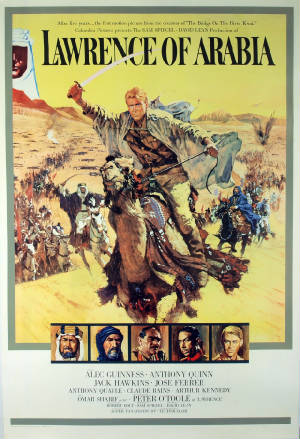|

(1962, directed by David Lean)
- inducted 2013 -
"The timing of my being asked to write about Lawrence of Arabia for the Muriels
Hall of Fame is perfect, as I had the opportunity to see it on the big screen for the first time recently. It is the essential
theatrical experience that I'd heard and assumed it is, its images overwhelming and immersive. Our introduction to Sherif
Ali, a barely perceptible black speck on the horizon that gradually reveals itself to be a man on a camel, is astonishing
when viewed in a dark theater. It's an image that director David Lean repeats throughout the film - characters appearing and
disappearing into the distance, dwarfed by the vast expense of desert and sky - and for good reason, as it never loses any
of its power. Though Lawrence of Arabia features explosions and violent battle scenes, some of its most powerful moments
rely on silence and image of a small figure making his way across vast expanses of desert, struggling not only to survive
but to write his own destiny.
"What makes Lawrence of Arabia particularly unusual for a prestigious, award-winning epic is that the spectacle is
entirely at the service of, and even an illustration of, its protagonist's inner life. At once a hero, a leader, an exhibitionist
and a masochist, Lawrence sees the desert as the manifestation of his own romantic, self-made identity. But the understated
tragedy of the movie is the way that reality repeatedly undercuts his dream of truly becoming a leader in his adopted culture;
Lawrence imagines himself as the Arabs' liberator, ignoring his actual part in strengthening the role of the British empire
in the region. By the film's end, he's outlived his usefulness for both his hereditary and adopted cultures; for all that
he's experienced, he remains incomplete. It's as if he, and the audience with him, are waking from a dream that had to end.
Still, what an amazing dream it is."
~ Andrew Bemis
Principal cast: Peter O’Toole, Alec Guinness, Anthony Quinn, Jack Hawkins, Omar Sharif, Josť Ferrer,
Anthony Quayle, Claude Rains, Arthur Kennedy, Donald Wolfit, I.S. Johar, Gamil Ratib, Michel Ray, John Dimech, Zia Mohyeddin,
Howard Marion Crawford, Jack Gwillim, Hugh Miller
Screenplay by Robert Bolt, Michael Wilson (originally uncredited; credit restored in 1978 by WGA)
Based on writings by T.E. Lawrence
Produced by Sam Spiegel, David Lean (uncredited)
Director of photography: F.A. (Freddie) Young
Production design by John Box, John Stoll (art direction)
Costume design by Phyllis Dalton
Film editing by Anne V. Coates
Original music by Maurice Jarre
Makeup by Charles Parker
Hair stylist: A.G. Scott
Sound by Paddy Cunningham (sound recordist), John Cox (sound dubbing), Winston Ryder (sound editor)
Special effects by Cliff Richardson
Second unit photography: Skeets Kelly, Peter Newbrook, Nicolas Roeg
Score conducted by Sir Adrian Boult
USA/UK
Duration: 216 minutes
Languages: English, Arabic, Turkish
Filmed in color (Technicolor)
Sound mix: 70mm 6-track (RCA Sound Recording)
Aspect ratio: 2.20:1 (Super Panavision 70)
Produced by Columbia Pictures and Horizon Pictures (G.B.)
Released in USA through Columbia Pictures Corporation
Premiered in London, England, UK on 10 December 1962
USA release date: 16 December 1962
Awards and honors:
- The Muriel Awards, 2012: 50th Anniversary Award (won)
- National Film Registry selection, 1991
- Selected as one of Roger Ebert’s “Great Movies,” 2 September 2001
- Academy Awards (USA), 1962: Best Picture (won)
- Academy Awards (USA), 1962: Best Director, David Lean (won)
- Academy Awards (USA), 1962: Best Music, Score – Substantially Original (won)
- Academy Awards (USA), 1962: Best Cinematography, Color (won)
- Academy Awards (USA), 1962: Best Film Editing (won)
- Academy Awards (USA), 1962: Best Art Direction-Set Decoration, Color (won)
- Academy Awards (USA), 1962: Best Sound (won)
- BAFTA Film Awards (UK), 1962: Best Film From Any Source (won)
- BAFTA Film Awards (UK), 1962: Best British Film (won)
- BAFTA Film Awards (UK), 1962: Best British Actor, Peter O’Toole (won)
- BAFTA Film Awards (UK), 1962: Best British Screenplay (won)
- Golden Globes, 1962: Best Motion Picture – Drama (won)
- Golden Globes, 1962: Best Motion Picture Director, David Lean (won)
- Golden Globes, 1962: Best Supporting Actor, Omar Sharif (won)
- Golden Globes, 1962: Best Cinematography - Color (won)
- DGA Awards, Directors Guild of America, 1962: Best Direction, David Lean (won)
- National Board of Review: Best Director, David Lean (won)
- Academy Awards (USA), 1962: Best Actor in a Leading Role, Peter O’Toole (nominated)
- Academy Awards (USA), 1962: Best Actor in a Supporting Role, Omar Sharif (nominated)
- Academy Awards (USA), 1962: Best Writing, Screenplay Based on Material From Another Medium (nominated)
- BAFTA Film Awards (UK), 1962: Best Foreign Actor, Anthony Quinn (nominated)
- Golden Globes, 1962: Best Motion Picture Actor – Drama, Peter O’Toole (nominated)
- Golden Globes, 1962: Best Motion Picture Actor – Drama, Anthony Quinn (nominated)
- Golden Globes, 1962: Best Motion Picture Score (nominated)
- American Cinema Editors ACE Eddie Awards, 1962: Best Edited Feature Film (nominated)
- National Board of Review: one of the Top Ten films of 1962
|

